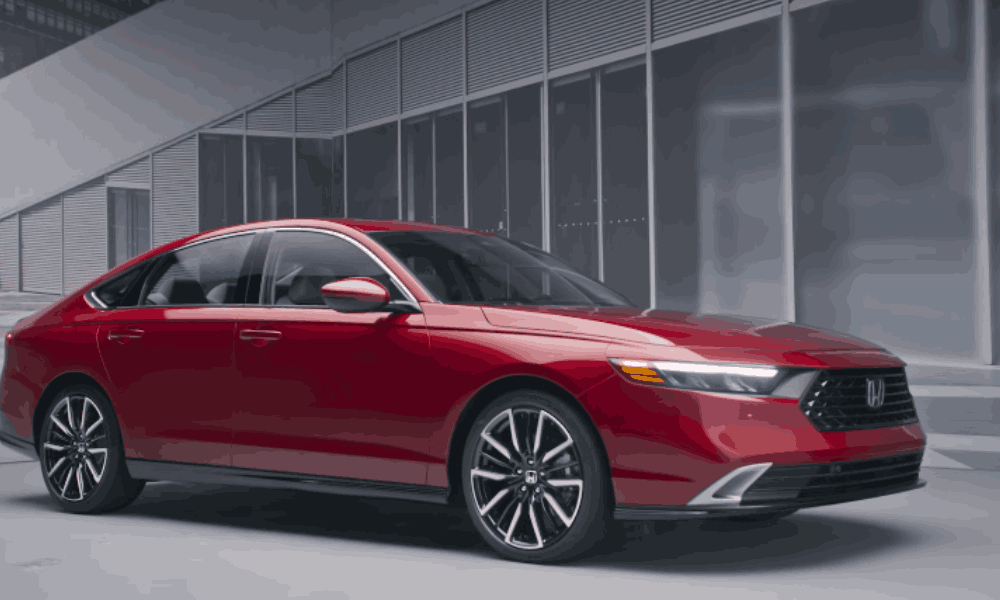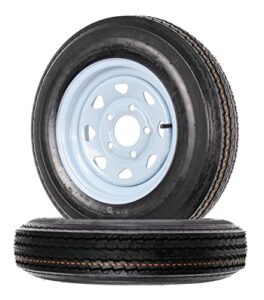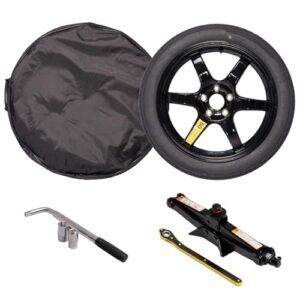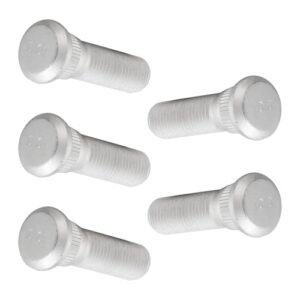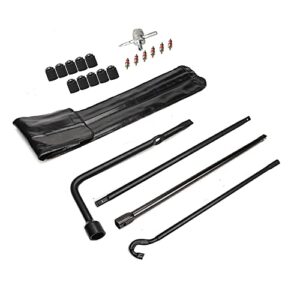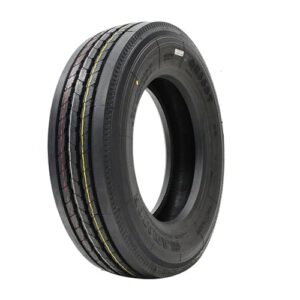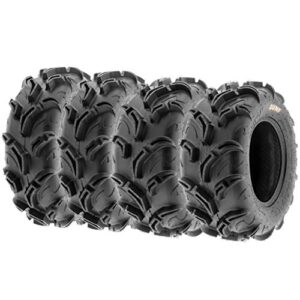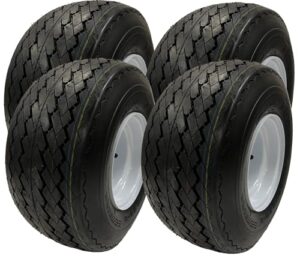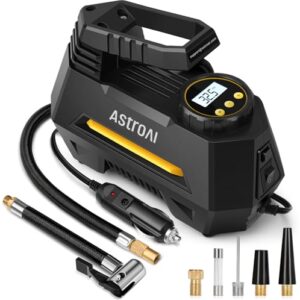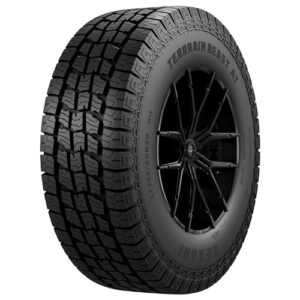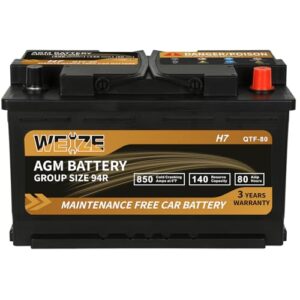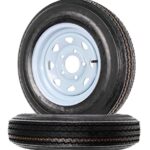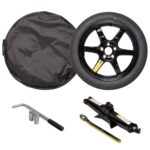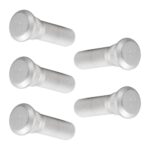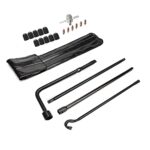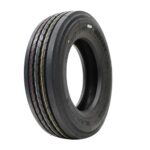The best tires for a Honda Accord vary based on use and climate but are often made by Michelin or Goodyear. Both brands offer options that balance performance, durability, and fuel efficiency.
Selecting the ideal tires for your Honda Accord is pivotal for ensuring a smooth, safe, and efficient driving experience. With various models cruising the roads, from daily commuters to performance enthusiasts, understanding which tires suit your specific needs is crucial.
Your Accord’s year and model significantly influence your choice, as tire requirements can differ based on the vehicle’s specifications. The proper set maximizes grip, improves fuel economy, and enhances overall performance.
Tires are not just a part of your vehicle; they are the foundation of your journey, connecting your Honda Accord to the road with precision and stability.
It’s essential to consider the tire type that matches your driving conditions, whether you’re navigating wet highways or cruising on dry suburban streets.
Honda Accord Tire Basics
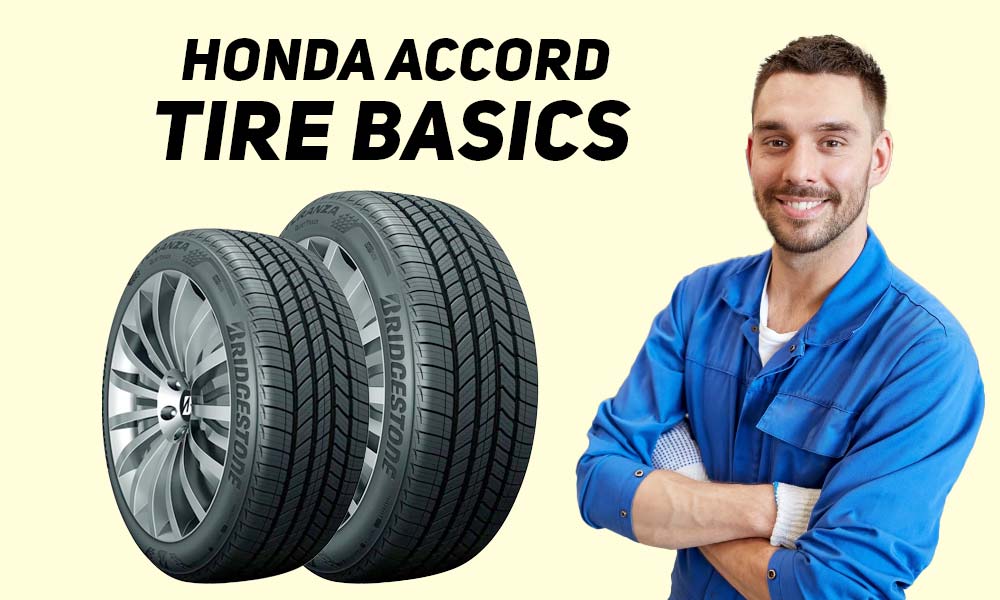
The right set of tires can transform your Honda Accord driving experience. From the daily commute to adventurous road trips, choosing the best tires for your Honda Accord is vital for safety, performance, and comfort. Understanding tire basics is the first step to elevating your ride.
Tire Types
Different tire types serve various driving conditions and performance needs. Here’s a quick rundown:
- All-Season Tires: These are the go-to for year-round performance. They offer a balance between wet and dry traction and sometimes even light snow capability.
- Performance Tires: Designed for those who seek enhanced handling and grip. A perfect match for the Accord driver looking for a sportier feel.
- Winter Tires: Indispensable in areas with heavy snowfall; these provide superior traction in cold, icy conditions.
- Touring Tires: Ideal for long-distance drivers. They offer a smooth ride with great high-speed stability.
Size And Fitment
Ensuring the proper size and fitment of your tires is critical for maintaining the integrity and performance of your Honda Accord:
| Aspect | Description |
|---|---|
| Tire Size | Refer to your owner’s manual or the sidewall of your current tires to determine the correct size. |
| Width | Tire width impacts traction and handling; wider tires might offer better grip, but can also affect fuel efficiency. |
| Aspect Ratio | The ratio of height to width; a lower aspect ratio often leads to improved performance at the expense of ride comfort. |
| Wheel Diameter | Must match the size of your wheels; incorrect diameter will lead to inaccurate speedometer readings and potential handling issues. |
For the Honda Accord, the tire size usually ranges from 16 to 19 inches, depending on the model and trim level. Always cross-reference your tire size with the vehicle’s specifications to ensure optimal fit and performance.
Performance Vs All-season Tires

Choosing the right tires for your Honda Accord can significantly influence your driving experience. Tires are vital components that affect your vehicle’s traction, handling, and safety on various road conditions.
Between performance and all-season tires, there are stark differences that cater to diverse preferences and driving conditions.
Let’s explore the advantages and disadvantages of each and uncover the best applications for your ride.
Advantages And Disadvantages Of Performance Tires
Performance tires are designed to provide superior handling and grip on road surfaces, particularly in warm climates. The advantages of performance tires include:
- Enhanced grip: Thanks to softer rubber compounds that stick to the road better.
- Stiffer sidewalls: This improves handling and cornering stability.
- Optimized tread patterns: For improved water evacuation and resistance to hydroplaning.
- Decreased tread life: Softer rubber compounds may wear out faster.
- Less performance in cold weather: Performance tires are not meant for snow or ice and can harden in cold temperatures, resulting in reduced traction.
- Higher cost: Typically, performance tires are more expensive compared to all-season tires.
Advantages And Disadvantages Of All-season Tires
All-season tires are the jack-of-all-trades in the tire world, offering a good balance of performance across a variety of conditions, including wet roads and light winter driving.
The advantages of all-season tires include:
- Versatility: Built to handle a range of weather conditions.
- Durability: Usually come with extended tread life warranties.
- Cost-efficiency: Generally less expensive than performance tires and offer good value over their lifespan.
On the other hand, all-season tires might not excel in certain areas:
- Lesser grip in extreme conditions: Not as sticky as performance tires, leading to longer stopping distances at high speeds or in very hot weather.
- Not suitable for severe winter conditions: While they can handle light snow, they’re not a substitute for winter tires in heavy snowfall or icy conditions.
Best Applications For Each Tire Type
When deliberating between performance and all-season tires for your Honda Accord, consider your local climate and driving habits.
| Tire Type | Best For | Not Ideal For |
|---|---|---|
| Performance Tires | Sports driving, warm climates, dry or wet roads | Cold weather, snow and ice conditions, budget-conscious drivers |
| All-Season Tires | Everyday driving, diverse weather conditions, drivers seeking value | Extreme weather, drivers seeking the pinnacle of grip and performance |
Performance tires are the go-to option for drivers who prioritize handling and speed, and frequently drive in areas with warmer temperatures.
In contrast, all-season tires are more suited for drivers looking for a practical solution that handles well in most conditions and provides durability over time.
Ultimate Grip And Handling

For Honda Accord owners, every drive is an experience that relies heavily on the quality of the tires fitted to their vehicle.
Ultimate Grip and Handling are not just premium features but a necessity for those who demand responsive steering and stability from their sedans.
The right set of tires can dramatically enhance the Accord’s performance, offering peace of mind amidst varying road conditions.
Let’s explore the intricacies of tread design and patterns, as well as wet and dry performance, to understand why these factors are crucial in selecting the best tires for your Honda Accord.
Tread Design And Patterns
The tread design of a tire is the foundation of its road-holding capabilities. Intricate patterns cut into the rubber form the basis for a tire’s grip on the road surface.
For the Honda Accord, tires with asymmetrical tread patterns often deliver superior handling. This type of design combines large, solid tread blocks on the outer shoulder for better cornering, with intricate inner grooves that assist in water evacuation.
- Continuous Ribs – Essential for straight-line stability and improved steering response.
- Lateral Grooves – Aid in reducing the risk of hydroplaning by channeling water away.
- Multipitch Tread Design – Helps in lowering road noise, contributing to a smoother ride.
Ultimately, the aim is to find a tire that combines these elements in a manner that complements your driving style while ensuring safety and performance.
Wet And Dry Performance
Tires need to show resilience against the elements, providing relentless traction whether the road is bathed in sunshine or drenched by rain.
Wet and Dry Performance is a measure of a tire’s ability to maintain grip under both conditions.
| Feature | Wet Performance | Dry Performance |
|---|---|---|
| Siping | Increases the tire’s biting edges for better grip on wet surfaces. | Ensures stability and grip during dry conditions. |
| Silica-Enhanced Rubber Compounds | Improves flexibility for better wet traction. | Delivers enhanced road holding in dry heat. |
Selecting tires with advanced silica compounds and adaptive siping technologies ensures that your Accord will have the gripping power needed, rain or shine.
Optimize your sedan’s performance by investing in tires that promise uncompromised grip and handling.
Tire Material And Construction
The right set of tires can make all the difference in your driving experience, especially when it comes to a vehicle as reliable as the Honda Accord.
Understanding tire material and construction is crucial for Accord owners who demand performance, safety, and durability.
This section delves into the specifics of what makes a tire suitable for your Honda Accord, focusing on the rubber compounds and the reinforcements and layers that work together to offer you the best ride possible.
Rubber Compounds
The quality of rubber compounds used in tire manufacturing significantly influences grip, tread wear, and weather resistance.
Each tire manufacturer has its unique recipe, often containing a blend of natural and synthetic rubbers.
- Natural Rubber: Offers good elasticity, high tensile strength, and resistance to tearing.
- Synthetic Rubber: Enhances specific properties such as thermal stability and longevity.
- Carbon Black: A reinforcing filler that improves durability and decreases wear.
- Silica: Also a filler, it reduces rolling resistance for better fuel economy and improves traction on wet surfaces.
Different proportions of these materials contribute to tires tailored for performance, all-season, or winter driving, shaping how your Honda Accord responds to various road conditions.
Reinforcements And Layers
Aside from the rubber compounds, what lies within the tire is equally important. The reinforcements and layers give a tire its structure and stability. These components include:
| Layer | Function |
|---|---|
| Beads | Steel wire coated in rubber, providing the strong link between tire and rim. |
| Body Ply | Layer(s) of fabric or steel that hold the tire’s shape and absorb stresses. |
| Belts | Steel layers above the ply, enhancing tread stability and puncture resistance. |
| Sidewall | A rubber layer providing flexibility and protecting the body from impacts. |
These components ensure that each tire can handle the load and speed ratings appropriate for a Honda Accord, while also guaranteeing a comfortable ride.
With the right tire construction, Accord drivers enjoy precision handling, longevity, and optimal safety on the road.
Choosing Top Tire Brands For Honda Accord
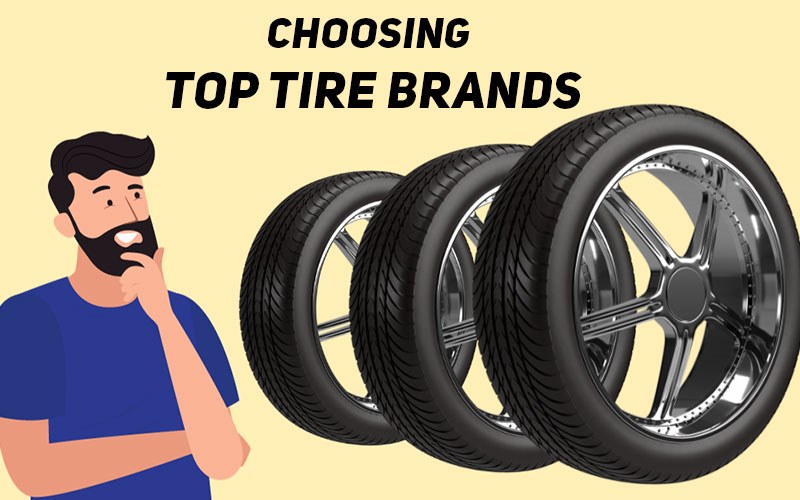
Selecting the perfect tires for your Honda Accord is crucial for ensuring a smooth ride, optimal performance, and safety on the road.
Buying tires is a blend of science and art; with the right information, you’re empowered to make choices that will serve you for thousands of miles.
Let’s dive into some of the top tire brands that stand out when considering new tires for your Honda Accord.
Top Tire Brands for Honda Accord
Brand A: Features And Benefits
Brand A has consistently been at the forefront of tire technology, offering a range of tires that stand out for the Honda Accord. With a focus on innovation and quality, here’s why they’re a top pick:
- Longevity: Their tires come with extended tread life warranties, promising long-lasting durability.
- Fuel efficiency: Engineered with low rolling resistance, these tires help in saving fuel by reducing the energy lost as heat.
- All-weather grip: Thanks to their advanced tread patterns and rubber compounds, you get superior traction in both wet and dry conditions.
- Ride comfort: These tires are designed to minimize road noise, making for a quieter, more comfortable ride.
Brand B: Features And Benefits
Brand B is renowned for their commitment to safety and performance. Honda Accord drivers looking for a reliable tire that won’t let them down under various driving conditions will appreciate what Brand B has to offer:
- Advanced Safety: With cutting-edge features that enhance traction and stability, these tires aim to keep you safe on the road.
- Year-Round Performance: Their all-season tires are great for drivers who experience diverse climates and want to avoid changing tires with the seasons.
- Exceptional Handling: Designed for responsive steering and cornering, these tires give drivers confidence on winding roads.
- Cost-Effectiveness: Brand B offers competitive pricing, making them a top value choice for budget-conscious drivers.
Customer Reviews And Recommendations
Choosing the best tires for your Honda Accord can significantly impact your driving experience. With a plethora of options available, customer feedback becomes invaluable for making an informed decision.
Owners of Honda Accords have taken to various platforms to share their insights on tire performance, longevity, and value.
The collective wisdom of these car enthusiasts can guide you to the tires that will best complement your driving habits and conditions. Let’s delve into what fellow drivers have to say.
Real-world Experiences
Understanding the practical implications of tire selection is critical. Countless Accord owners have shared stories highlighting their tire experiences under diverse conditions.
From smooth highway cruises to navigating treacherous weather, these accounts offer a window into the real-world performance of various tire brands.
- Michelin Defender T+H: Owners laud its exceptional tread life and comfort.
- Goodyear Assurance WeatherReady: Praise for its superior grip in wet and snowy conditions.
- Continental PureContact LS: Fans of its balanced handling and fuel-saving capabilities.
These firsthand experiences suggest that the right tire can not only improve the feel of the drive but also provide peace of mind in all weather scenarios.
Quality And Durability
Aside from performance, longevity and build quality are top considerations for Honda Accord owners. Users frequently share their satisfaction or concerns regarding how well tires withstand daily demands.
| Tire Model | Quality Rating | Durability Feedback |
|---|---|---|
| Bridgestone Turanza QuietTrack | 4.5/5 | Praised for its long wear life and persistent quiet ride. |
| Pirelli Cinturato P7 | 4/5 | Appreciated for its consistent performance over time, with few reports of early wear. |
| Yokohama AVID Ascend GT | 4.2/5 | Regarded for its durability, even in challenging road conditions. |
Tires that couple strength with longevity ensure that drivers enjoy a safe and stable drive over the course of many miles. Trustworthy tires that stand the test of time are a common theme among satisfied Honda Accord owners.
Tire Maintenance And Longevity
Ensuring that your Honda Accord operates at peak performance isn’t just about what’s under the hood; it also involves maintaining the only part of your vehicle that touches the road – the tires.
Proper tire maintenance and longevity go hand in hand with your Accord’s overall health and efficiency. From inflation to rotation, treadwear to mileage ratings, understanding these aspects can save you money and keep you safe on the road.
Let’s dive into the best practices that will extend the life of your tires and enhance your driving experience.
Inflation And Rotation
Keeping tires properly inflated is critical for safety, fuel efficiency, and tire longevity. Your Honda Accord’s manual includes the recommended tire pressure, vital to follow for optimal performance.
Under-inflated tires can cause poor handling, increased wear, and even blowouts, while over-inflation leads to decreased traction and uneven wear.
Regular tire rotation is another key component in extending the life of your tires. By rotating your tires, you ensure that they wear evenly, preventing premature replacement and maintaining proper handling.
A good rule of thumb is to rotate your tires every 5,000 to 8,000 miles or according to your specific vehicle maintenance schedule.
Treadwear And Mileage Ratings
Understanding treadwear ratings and mileage warranties can be a game-changer for your Honda Accord. Treadwear grade is a comparative indicator of a tire’s expected wear rate.
The higher the treadwear number, the longer it should last. Conversely, a lower number indicates quicker wear.
Also, be aware of tires that come with a mileage warranty, which typically reflects the expected longevity of the tire under normal driving conditions.
To assess your tire’s health, perform the penny test – place a penny into several tread grooves across the tire. If part of Lincoln’s head is always covered, your treads are deep enough. If the top of Lincoln’s head is visible at any point, your tires need replacing.
Frequently Asked Questions
What Are The Top Tire Choices For Honda Accord?
When choosing tires for a Honda Accord, consider the Michelin Defender T+H for their longevity and the Goodyear Assurance Fuel Max for fuel efficiency. Bridgestone Turanza QuietTrack is praised for its quiet ride, and Continental PureContact LS for all-season performance.
How Often Should Honda Accord Tires Be Replaced?
Tires on a Honda Accord should generally be replaced every 5 to 6 years, or whenever the tread wear indicators are flush with the tire’s tread. For optimal safety and performance, perform regular checks for wear and tear.
Can I Improve Honda Accord Fuel Efficiency With Tires?
Yes, choosing low rolling resistance tires like the Michelin Energy Saver A/S can improve the Honda Accord’s fuel efficiency. They are designed to reduce energy loss as the tire rolls, which can translate to fuel savings.
What Size Tires Fit A Honda Accord?
The Honda Accord typically fits tire sizes ranging from 16 to 19 inches, depending on the model year and trim level. Always check the owner’s manual or the placard on the driver’s side door frame for the exact size recommended for your vehicle.
Conclusion
Selecting the ideal tires for your Honda Accord shouldn’t be a challenge. We’ve outlined options that blend durability, performance, and value. Your Accord deserves the best, ensuring safety and a smooth ride. Remember, picking the right set enhances your driving experience significantly.
Drive confidently, knowing you’ve made a wise choice.


